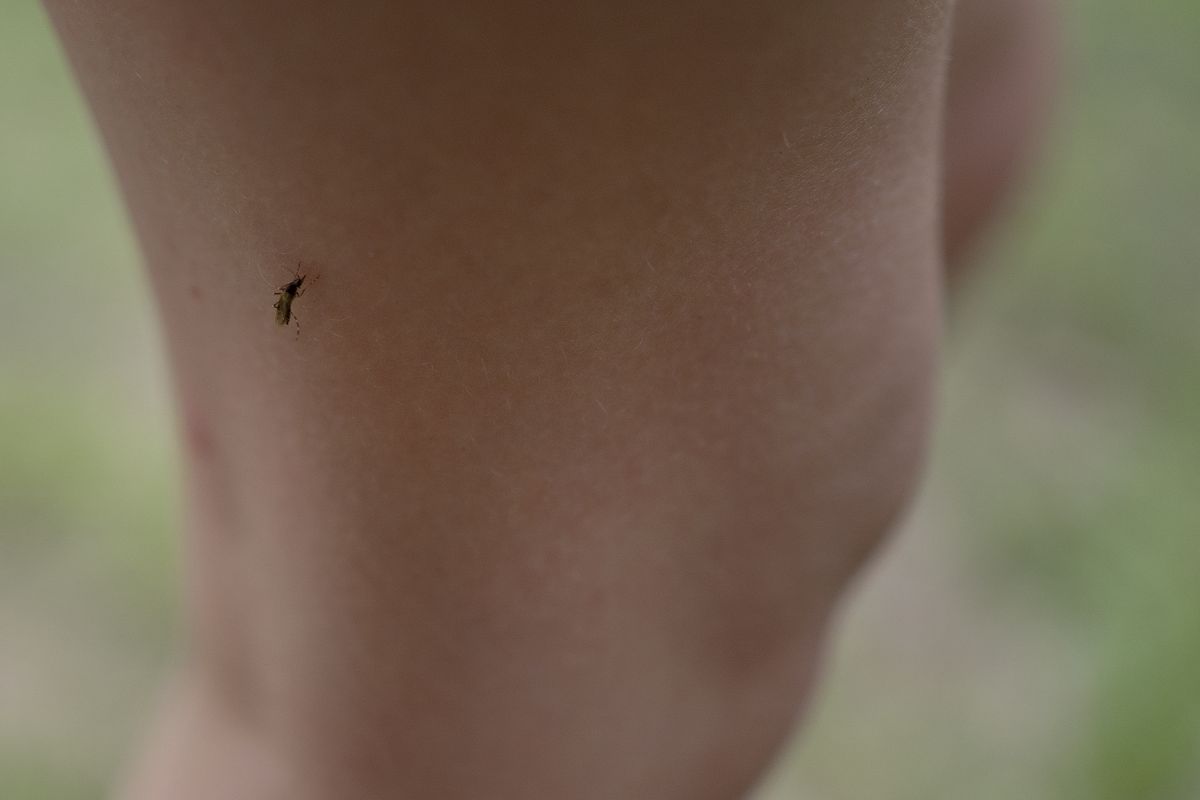Mosquitoes are swarming around Houston. The future could bring even more

CONROE, Texas – Standing in his neatly manicured front yard in this Houston suburb, Mitch Varley stopped for a moment and slapped his right arm. Did he get the mosquito in time before it bit? Not that it matters, really, because there will be another.
“If you open the car door to go somewhere, you’ve got 10 mosquitoes inside,” Varley said.
The native Texan has lived north of Houston, in Montgomery County, since 2015 and said he’s never seen mosquitoes this bad. “I’d like to get rid of them, but with all this rain that we’ve had, what are you going to do?” he said.
After flood-inducing rain pummeled much of Texas over the past few weeks, another sort of inundation is swamping the Houston region: mosquitoes. Lots of them. More than many longtime residents can remember.
On Thursday, another powerful storm swept through the area, downing trees and power lines, and leaving more than 900,000 residents without power at one point.
Mosquitoes have always thrived around Houston. Because the area’s landscape is relatively flat, many streets are lined with ditches to capture and drain stormwater into a network of bayous or slow-moving rivers that feed into Galveston Bay. Along those routes, there are plenty of nooks and crannies that make for ideal mosquito breeding grounds.
But “as it gets warmer earlier, we see a larger amount of mosquitoes earlier,” said Max Vigilant, director of mosquito and vector control in Harris County, where Houston is located. “We are getting hotter temperatures earlier.
“This is the impact that climate change has had on Harris Country.”
As the world gets warmer and – in many areas – wetter, scientists worry that human-caused climate change may turn more places into perfect breeding grounds for mosquitoes. Higher temperatures often make the pests hungrier for human blood and allow them to expand their territory. Increased rainfall gives them more pools of standing water in which to procreate. Many types of mosquitoes wait for just this moment to spring to life.
Controlling the swarm
Texas is soaked after storms over the past three weeks submerged roadways and homes, edged rivers to near-record levels, and caused deadly flooding. In the Houston area, the pests are flourishing in the soggy soil and pavement puddles that have yet to dry up, leading many locals to declare this an unusually bad mosquito season.
Vigilant, the public health official, has heard it before. To many residents, every year feels like the worst mosquito year, he said, though sampling so far suggests mosquito levels comparable to those in 2022 and 2023.
It is next to impossible to fully count an insect population. But in tests last week, between 50 and 70 mosquitoes a minute were landing on staffers in some spots in Harris County, Vigilant said.
Harris County, where it is warm enough to find the insects year-round, is home to more than 50 species of mosquito. “Houston is never completely mosquito-free,” said Sonja Swiger, an entomologist at Texas A&M.
But the warmer months are when they truly thrive. Some lay their eggs directly in standing pools of water. Others place them in the soil and other dry areas that fill up later, with some eggs waiting up to a year to hatch. “That’s the level of intelligence of a mosquito,” Vigilant said.
Harris County Public Health, where Vigilant works, focuses on spraying pesticide for those mosquitoes that can carry West Nile virus and a half-dozen other diseases for which it tests.
“Our most important one is West Nile virus,” Swiger said. “We do have to worry about that every year.”
As of Thursday, the public health department has not detected any of the pathogens. Health officials encourage residents to turn over or throw out birdbaths, old tires and other items in which water can accumulate. And of course, apply plenty of Environmental Protection Agency-approved repellent. Local doctors even recommend putting nets over strollers to protect infants from bites.
Enduring mosquito season
Before Linda Adams begins her morning walk with her dog, Tater Tot, she makes sure to douse herself in bug spray. “It has to be at least 40% DEET,” Adams said. “It’s the only way I can get through the day.”
Adams sprays herself anytime she steps outside. She collects rainwater for her garden, but with the recent surge in mosquitoes, she makes a point to dump her rainwater collection every day unless she’s going to use it.
She doesn’t want to give mosquitoes any more chances of breeding.
The nuisance insects have also made their way into her house, something she said has never happened before. This week, she sat in her recliner swatting them away as she watched TV.
“They are attracted to me. No one else gets mosquitoes like me,” Adams quipped. “I was also a redhead as a child. I think that has something to do with it.”
There is little reprieve, no matter the time of day.
Josue Medina, a tennis instructor in Conroe, had just finished a morning tennis lesson when he stopped to point at a large red welt above his right knee. “This right here,” he said. “This one got me yesterday.”
As a full-time instructor, Medina spends four or more hours on a tennis court during the day, which means he’s all too familiar with the swarm of mosquitoes plaguing the Houston area. Not only are there a lot this year, said Medina, but they’re bigger.
The evening lessons are particularly bad, said Medina, who claims he has “blood that mosquitoes love.” One night this week when he arrived around 7, he said, mosquitoes immediately swarmed his legs. “The mosquito season is always bad, but right now it’s worse,” he said.
- – -
Dino Grandoni reported from Washington.